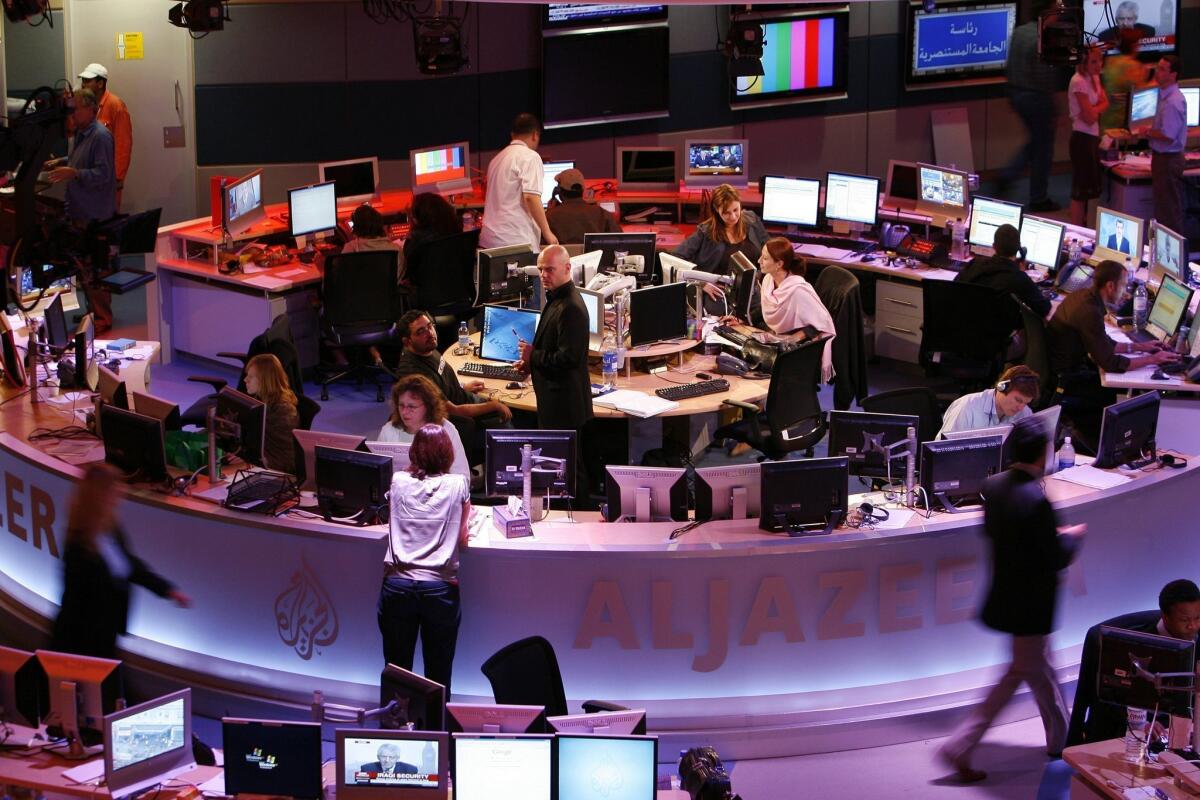Turn the channel to Al Jazeera

- Share via
AMMAN, JORDAN — The Arab world’s best-known satellite TV network purchased the American cable channel Current TV last week. That means you may soon be able to add “Al Jazeera America” to your remote control favorites. If you’re a news junkie like me, you should tune in. The network, founded 15 years ago in the Qatari capital of Doha, has forever improved TV news, especially in the Middle East.
Before Al Jazeera, many Arabs could watch only state-owned and -run television stations that primarily broadcast official images of one esteemed leader or another, usually holding court at his palace, often to the background sound of classical music.
Before Al Jazeera, live interviews were for the most part banned on Arab TV. News anchors were handed text vetted by security officials and government representatives. Newsmakers couldn’t be spoken to live by guests, because how could the government predict what they would say? What if something was revealed that the public was not supposed to know?
Al Jazeera changed that. Few people realize that many of its original staff members were trained at and worked for the BBC. Right away, Al Jazeera Arabic, in the flagship broadcast, provided live interviews and, more important, something Arab state media never dared to touch: the other point of view.
No matter how controversial the issue or events, Al Jazeera has given the “other side” — including Israeli officials — opportunities to respond. Faisal Qassem’s program, “Itijah al Muakis” (“The Opposite Direction”), attracted some 60 million viewers Tuesday nights to watch total opposites debate their points of view. Most Arabs learned about the very existence of opponents of Saddam Hussein, Moammar Kadafi and the Assads from Al Jazeera.
But Al Jazeera Arabic, which I watch at my home in the Mideast along with Fox News, MSNBC, the BBC and CNN, is unashamedly an Arab station. Its Arab biases, and most recently its “Arab Spring” biases, are clear. It is owned by the Qatari royal family. It has been accused of Islamist and anti-Israeli leanings. The George W. Bush administration attacked it for its Iraq coverage.
And indeed, Al Jazeera Arabic spins the news, but in its 15 years of broadcasting it has not been known for grievous and intentional lying or distortion.
And as to spin and point of view, Fox is a conservative channel, and MSNBC is liberal. When mainstream, ABC newsman Ted Koppel was embedded with the U.S. Army during the invasion of Iraq, he spoke of “we” and “our” troops. George Stephanopoulos’ “This Week,” on ABC, reports only the names of U.S. troops killed in action in the Mideast, not Iraqis, Palestinians or Afghans.
In any case, the international, English version of Al Jazeera is a different animal. Its tone and even sound level are calmer. You don’t feel as if you are entering a war zone every time you watch it. Well-known and respected reporters, anchors and editors from many nations make up the team for the Doha-based station and its foreign outposts. This version of Al Jazeera won a Peabody Award for its “Arab Spring” coverage. Its 24-hour news shifts among regions, providing prime-time listeners in China, for example, with news relevant to them at 8 p.m.
Some might argue that the differences between Al Jazeera Arabic and international Al Jazeera amount to deception or hypocrisy. But CNN has an international version, a Turkish version and a Mexican version. If you watch the U.S. domestic version versus the international broadcast, you will see a marked difference in the news lineup and the time spent on various topics.
The United States is deeply involved in the Middle East. America is pursuing policies and its national interests in a region that is at best badly understood by U.S. citizens. This misunderstanding has led to wars and has prolonged violence in more than one Middle Eastern region. At a time when American television networks are reducing their overseas bureaus it is crucial that the U.S. public is allowed an opportunity to find out more about what is happening in other parts of the world, and how the rest of the world sees itself and the U.S. What better source to hear about the Middle East than from a broadcaster whose professionalism has been tested over the years?
The Arab peoples have been stereotyped for years as a result of superficial coverage that has failed to understand the complexities of the Middle East. If Al Jazeera’s stepped-up presence in the United States can help humanize the Arab and Islamic world, it can provide a badly needed bridge for peace and understanding. Americans especially should welcome it, and the happy opportunity to see again their cherished 1st Amendment put into practice in the wider world.
Daoud Kuttab, a Palestinian journalist, is a former professor of journalism at Princeton University and the director general of the Amman, Jordan-based Community Media Network.
More to Read
A cure for the common opinion
Get thought-provoking perspectives with our weekly newsletter.
You may occasionally receive promotional content from the Los Angeles Times.






